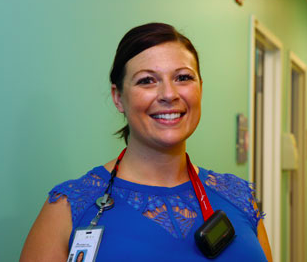
Jen Haney, Hart Family Cochlear Implant Education Coordinator, has been incredibly busy in her efforts to meet the sudden needs of parents and professionals brought about by the pandemic.
As professionals, therapists, and parents navigate the new normal through e-learning and teletherapy, Jen has consulted with those in need by providing resources, strategies, and recommendations on how to effectively support our cochlear implant population. Kristen Van Dyke FHSR’s Executive Director caught up with Jen last week to talk about how she has pivoted to support both parents and professionals.
This Sunday, May 17th, Lurie Children’s will be holding their annual Move for Kids Fun Walk to support quality medical care for children.
FHSR is proud to participate in this Virtual Event through our Mal’s Pals and FHSR teams.
Over 3,000 Audiology Patients are treated at Lurie Children’s Hospital each year.
100% of your donation will be used to support the Audiology programs supported by FHSR.
Please join us & donate to support our teams!
Mal’s Pals Team & Team FHSR
#Move4kids
Kristen:
What has changes on the education landscape, how are professionals seeking support with the distance learning?
Jen:
Professionals have relied on my assistance on how to best support their students during this time. I have provided information on appropriate accommodations (interpreters, assistive technology, captioning, etc.) through e-learning platforms. Teachers have asked about auditory skill development and its appropriateness as it is being done over the computer rather than face to face. Ideas on taking this opportunity to work on repair strategies, self-advocacy skills, listening comprehension, and promoting the use of streaming capabilities related to their cochlear implants has been discussed. There are a variety of premade e-learning resources becoming available daily which I am filing for potential questions or support as needed. My recommendations have also included the importance of working with the student’s general education teacher regarding lessons, targets, and teaching methodologies they will be using (direct instruction, videos, independent work, etc.) before instruction is provided. I have suggested targeting IEP goals in conjunction with any learning targets established by the general education teacher. As experts in hearing loss, it is vital that itinerants and therapists support their students in accessing the curriculum. I have also offered itinerants and therapists resources on activities to do during one on one sessions with their students.
Kristen:
How are the Early Interventionist working with their patients right now? Are they using Teletherapy?
Jen:
Early Intervention therapists have asked how to provide meaningful therapy sessions to families when working with such young children. Throughout this time, I have been able to be trained in providing teletherapy and have stayed abreast of current Illinois policies and procedures related to the birth-3 population. This has allowed me to educate professionals on best practices in teletherapy. Some early intervention families have children aging out of the early intervention system and transitioning to school. This can be a stressful and overwhelming time for families which has been heightened by the addition of the pandemic. I have assisted in supporting them on what to expect during their IEP meeting, answered a variety of questions related to the transition process, and touched base with service coordinators, and evaluation teams to find out answers to any questions I am unable to answer.
Kristen:
I am sure this is a challenging time for parents, are there any tips or insight you can provide to support the parents of children with cochlear implants?
Jen:
Parent support has been critical as this has been a trying time. Many are feeling overwhelmed as they are trying to work full time from home, support their child during the e-learning process, and address emotional and behavior issues related to this abrupt transition. I have counseled families in a variety of ways. From an e-learning aspect I have encouraged families to ensure their child’s accommodations and related service minutes (speech, itinerant, etc.) are being met. If they are feeling overwhelmed by the amount of work their child is receiving, it is imperative they contact the teacher to problem solve. I have also coached families on experiential and function learning opportunities within the home (ex: helping cook and working on measurements, sorting laundry by color, learning how to wash clothes, etc.) or meaningful technology they can utilize (apps, virtual field trips, books online). Many are struggling with a change in their child’s emotional state and/or behavior (obstinance, frustration, acting out, sadness, nervousness, not wanted to wear devices). My suggestions have included creating a routine and structure, using a written/visual schedules, providing positive reinforcement/reward systems, take advantage of pre-made materials to explain COVID, and model/discuss feelings about the situation to promote an environment for open dialogue.
Kristen:
What other action items are you working on to support the cochlear implant program at Lurie Children’s Hospital?
Jen:
When not directly interacting with families and professionals, I have used this opportunity to update forms, revamp existing presentations, plan for next school year, brainstorm new presentation topics, participate in free webinars on remote learning and other pertinent topics, and catch up on other clerical tasks (organizing, recording notes, updating spreadsheets). I am also working with Dr. Young to problem solve how we can continue to best support families through potential webinars or online supports.
Jen, thank you so much for taking the time to provide this update, it sounds like you have had a lot on your plate! It is amazing how you have been able to so quickly adjust your work from in person to online formats and still provide the same high caliber support for both families and professionals. The parents, educators and therapist must be especially grateful to have you as a resource during these ever-changing times!
Thank you, Jen Haney!



